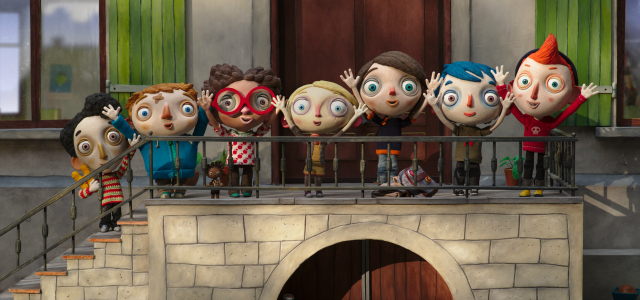My Life as a Courgette
A visual delight that gets you square in the tear-ducts.
Plot summary
When his alcoholic of a mother dies in an accident, young Courgette (Erick Abbate) is taken to live in a foster home. Troubled by his recent tragedy, he initially struggles to his new life. With the help of a kindly police officer (Nick Offerman) and the wide variety of fellow orphans, though, Courgette gradually learns to heal.

Though colourful and visually popping, children’s animation can be remarkably adept at tugging the heartstrings. It’s guilty of caving to easy manipulation and doe-eyed schmaltziness every now and then, sure, but when it’s smart, it can be devastating. Maybe it’s the bait-and-switch juxtaposition of storybook images and incisive emotional truths that makes it so effective. Maybe it’s the heart-rendering simplicity of their allegories – or maybe, even, it’s that such emotions are simply universal. Whatever the secret is, from My Neighbour Totoro to Toy Story 3, they are almost unparalleled in their ability to give voice to often-inexpressible sentiments.
And so it goes with My Life as a Courgette, Claude Barras delicately profound concoction detailing the plight of a boy with a weird nickname and the band of orphans who help him get by. On its surface, it’s a children’s toybox of visual delights: ethereal wood-carvings with endlessly expressive eyes are our characters, occupying blocky environments that resemble a child’s drawing of a picture-perfect postcard. Barras lets his action (well, more ‘contemplation’) unfold with endless patience, giving his characters the room to grow and develop and, ultimately, get you square in the tear-ducts.
See, beneath the largely-absent plot and low-key Etre et Avoir rhythms are some seriously heavy notions, with Courgette’s group consisting of survivors of abuse, children of suicide and orphans of deportation. Little is explicitly said out loud, but the shadows of these tragedies and injustices are implicit in the physicality of the characters, the items they hold dear and the things that aren’t said. We meet them all broken but, through their shared strength, they cling on to whatever sliver of hope they can envision. The payoff isn’t grandiose, but it hits you like a steamroller. Courgette’s power is one of hushed compassion.
As with Inside Out, Barras’ sidelines easy sentimentality in favour of a more mature, resilient look at coping. Throughout its cuteness and bittersweet ruminations, past the dallies with whimsy and moments of barely-whispered bleakness, is a simple testament to the strength of family, blood or (more accurately) otherwise. And it’s one to cherish.










COMMENTS